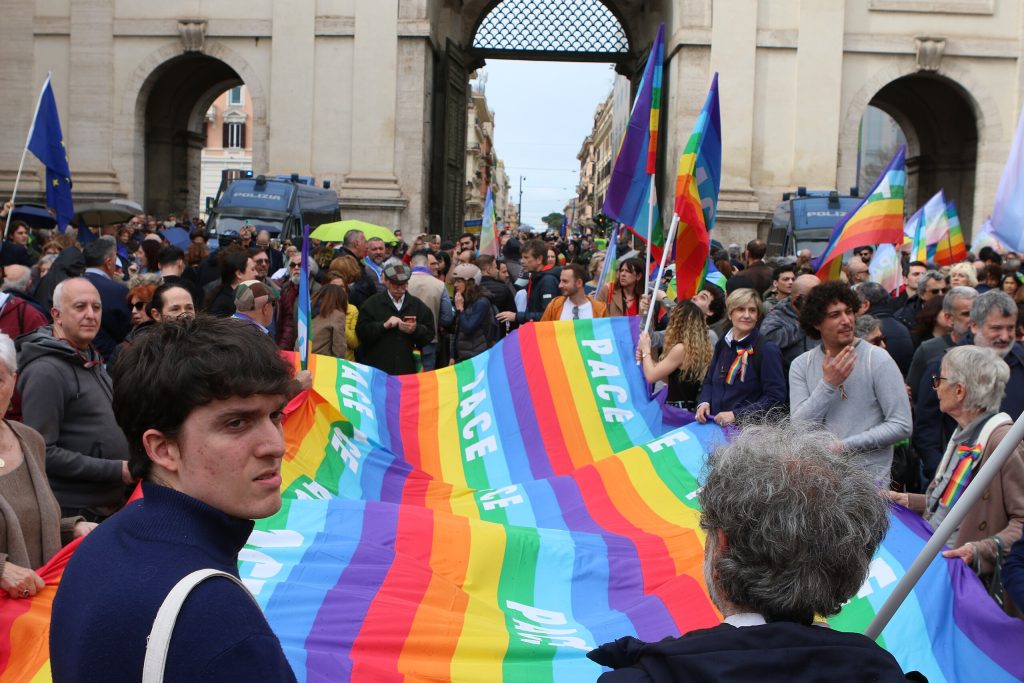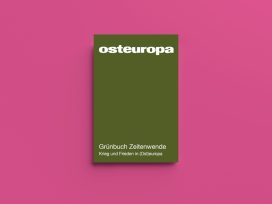
As capital consolidates, culture recedes, funding vanishes, access narrows. The question persists: why fund culture at all? Cultural managers from Austria, Hungary and Serbia discuss.
The sharp drop in support for Ukraine in Italy has less to do with the traditionally Russia-friendly economic policy of the Italian right, and more with the anti-Americanism rooted in the political culture of the Italian left, which now articulates itself as pacifism.
“In 2022 we blamed Russia for the war in Ukraine, while in reality the responsibility for it is 50/50. Both NATO and Russia had competed over Ukraine.” This quote comes from a long speech by Marco Travaglio, an Italian journalist, during the èStoria festival, held in the city of Gorizia in May 2025. Travaglio conceded that the Russian leader Vladimir Putin “is an autocrat”, but the core of his argument was that the West had conspired to provoke Russia into war since the 1990s as part of a strategy to weaken it. He also described Ukraine as a divided country where fascist ideology plays a significant role.
These views, including some elements of Russian propaganda under the guise of neutrality, are neither new nor surprising. Travaglio has been voicing similar lines since before the beginning of Russia’s full-scale invasion of Ukraine in 2022. He portrays himself as an outcast in the Italian media landscape, which, he claims, is dominated by “warmongers” – his label for those who support Ukraine’s right to defend itself.
In reality, this self-styled outsider persona is a carefully crafted narrative that resonates with his many followers, who view him as a challenger to mainstream discourse. Travaglio is the director of Il Fatto Quotidiano, one of Italy’s best-selling newspapers, which he co-founded in 2009. He is also a regular guest on political talk shows broadcasted on national TV channels, hardly an outcast.

Rome, 15 March 2025. Photo: Horcrux / Source: Wikimedia Commons
Travaglio’s fame mostly comes from his journalistic investigations on Silvio Berlusconi’s murky affairs in the first decade of the 2000s, when the late politician was at the peak of his power. Berlusconi notoriously despised Travaglio, but the two would ironically end up sharing similar views on what they consider to be the causes of the war in Ukraine. A few months before he passed away in May 2023, the former prime minister claimed that the Ukrainian president, Volodymyr Zelenskyy, “provoked” Russia’s invasion.
Travaglio and Berlusconi also share another trait: both are sensitive communicators, who are naturally able to grasp the sentiment of public opinion. In 2022, both well understood that there was a part of the Italian public inclined to believe that the war in Ukraine was not just the result of Russia’s leadership imperial ambitions, and leveraged this understanding for their own gains. The fact that two public figures from opposite sides of the political spectrum voiced similar opinions on the conflict reveals how widespread those beliefs are in Italy. A 2025 IPSOS poll shows that 57 per cent of Italian respondents did not support either Russia or Ukraine (in 2022 only 38 per cent of the polled individuals considered themselves as neutral). The same poll shows that support for Ukraine has sharply decreased in Italy over the last three and a half years, from 57 per cent in 2022 to 32 per cent in 2025. A recent SWG survey also shows that 41 per cent of the respondents thought that Italy should stop sending weapons to Ukraine (while 42 per cent think that it should keep sending them). Meanwhile, 11 per cent of the respondents declared their support for Russia.
Many factors have to be considered to understand this state of affairs, which cannot be attributed entirely to Russian interference. It is beyond any doubt that such interference does exist, but Moscow’s disinformation efforts needed fertile ground in which to take root. Therefore, it is important to understand how these foundations came to be both on the left and right side of the Italian political spectrum. To do that, we must look back to the Cold War era. While within the American sphere of influence and one of NATO’s founding members, Italy was home to the largest communist party in Western Europe. The Italian Communist Party (PCI) never succeeded in winning a national election, but from the late 1940s to the 1980s, it consistently held the position of the second most popular party in the country. Its best electoral result was 34.4 per cent in the 1976 parliamentary elections. Apart from its name, the PCI had little in common with its Eastern European counterparts.
Although it received political and financial support from Moscow, the party was far from being just a Soviet proxy. In particular, under the leadership of Enrico Berlinguer (1972-1984), the PCI embraced the policy of so-called Eurocommunism, distancing itself from the Soviet Union to focus on socio-economic issues within the framework of liberal democracy. The violent crackdown by the communist authorities on demonstrations in Poland ultimately led to a formal break between the PCI and Moscow in 1982.
Given these caveats, strong anti-American and anti-NATO sentiment was widespread within the PCI leadership and among its voters, leaving a lasting influence on Italian public opinion. The end of the Cold War coincided with the decline and eventual dissolution of the PCI in 1991, after which its members dispersed into a range of new parties competing for the same electoral base. Those voters were left without the ideology in which they believed, but with a view on international affairs inherited by that ideology, which was clearly influenced by aforementioned anti-American and anti-NATO sentiment.
This sentiment was inflated by internal and external developments in the 1990s and early 2000s. From 1960s to 1980s, Italy suffered numerous terrorist attacks by both left and right-wing extremist groups. In the 1990s, various parliamentary committees were held to investigate and prosecute these crimes. According to various leftist politicians and conspiracy theorists like Daniel Gansier, the United States supported various extremist groups organizing these attacks as part of a “strategy of tension” to stop the PCI from taking power in the country.
The real extent of the American interference has never been fully proven, but the investigations and allegations were enough to strengthen the feeling of distrust towards Washington on the left. Moreover, the NATO bombing of Yugoslavia in 1999 and Italy’s contribution to it was perceived extremely negatively in leftist circles. Similarly, the decision of the Bush administration to invade Iraq in 2003 was met with huge pacifist protests in Italy.
Looking at the political centre-right, the ever-present Christian Democracy (DC) party, which led Italian governments continuously from 1946 to 1981, opposed communism and supported an Atlanticist foreign policy. At the same time, there were factions within the party that favoured economic cooperation with the Soviet Union. The most striking example of this approach was the 1966 agreement between the Italian car manufacturer FIAT and the Soviet government, which was backed by DC. This led to the establishment of an automobile plant in the city of Togliatti on the Volga river. There, in 1970, production began on a car based on the FIAT 124 model: the legendary Zhiguli.
With the collapse of the Soviet Union, this economic interest became more relevant, as the Russian Federation came to be increasingly viewed by the centre-right — historically close to the corporatist world — as a land of boundless business opportunities. On the one hand, there were imports of cheap oil and gas, in which the energy company ENI played a huge role. On the other hand, there were exports of high-end Italian goods beloved by the new Russian elite.
While the personal friendship between Silvio Berlusconi and Vladimir Putin often made headlines, Italy maintained an openly friendly foreign policy toward Russia from 1991 until the beginning of the Kremlin’s aggression against Ukraine in 2014, regardless of the many governments in power during that period and their political leanings. To this equation, it should be added that the Italian public had (and still have, to an extent) an extremely poor understanding of the ethnolinguistic landscape of the former Soviet Union and its satellites. All the countries from the area were inherently perceived as “Russian” and many people would have interpreted the region through this Italian lens. Italy is a country with a countless number of dialects. Thus, if the peninsula has Neapolitan, Roman or Sicilian dialects, they thought that, in similar fashion, “Russian” must also have dialects, be it Ukrainian, Georgian or Tajik. This aspect should not be overlooked, as ignorance would become fertile ground for any sort of disinformation coming from Russia (consider the example of Putin’s mantra about Ukraine not being a real country that was invented by Vladimir Lenin).
It was in this context that the Euromaidan Revolution erupted in 2013. This was followed by Russia’s annexation of Crimea, the declarations of independence in the so-called Luhansk and Donetsk people’s republics, and the outbreak of war in the Donbas region. On the left side of the Italian political spectrum, the idea that a country might enthusiastically seek EU, and especially NATO, membership was often seen as inconceivable. Many believed that Ukrainians could not genuinely desire to join the Alliance, and that such aspirations must have been orchestrated from the West. As a result, any rumour discrediting the Maidan movement was readily welcomed by segments of the left. This made it easy for narratives portraying the Ukrainian protests as fascist in nature and heavily influenced by the West, to gain traction, especially among a largely disengaged and indifferent public.
On the political right, there was dissatisfaction with the first western sanctions against Russia, which were widely seen as obstacles to profitable business relations. In 2018, Matteo Salvini, leader of the right-wing Lega Nord and then (and current) deputy prime minister, stated that he considered Russia’s annexation of Crimea legitimate, citing the outcome of the farcical referendum in 2014. He also added that he was in favour of removing sanctions against Russia as they were harmful to Italy and the European Union. A year earlier, he had famously posed in Moscow’s Red Square wearing a t-shirt featuring Vladimir Putin. In 2019 the magazine L’Espresso published an exposé alleging financial ties between Russia and Lega Nord, though these connections have never been fully proven. Beyond economic interests, many right wingers held a broader ideological admiration for strongman leadership, and Putin was often seen as embodying that model.
The picture changed dramatically on February 24th 2022. The horror and violence of the war had a profound impact on Italian public opinion. Many finally came to view the Russian regime as solely responsible for the events unfolding in Ukraine. In a very theatrical turn of events, on March 8th that year, the aforementioned Salvini, while visiting a refugee centre, was confronted for his past support of Putin by Wojciech Bakun, the mayor of the Polish town of Przemyśl on the border with Ukraine. In the immediate aftermath of this public humiliation, the Italian politician was forced to publicly condemn Putin for the invasion.
Open support for Russia diminished significantly, remaining mostly confined to the far left and far right of the political spectrum. This was clear regarding a plethora of small political movements, media outlets and cultural organizations broadly labelled as “rossobruni” (a portmanteau of red, representing communism, and brown as the Brownshirts, the first Nazi paramilitary group). One of these groups is responsible for hanging hundreds of pro-Russia billboards around Italian towns in 2024.
At the same time, a wave of “pacifist” protests emerged in the early days of the invasion, bringing people together under the slogan “neither Russia nor NATO”. Unlike the 2003 anti-war movement, which unequivocally condemned American imperialism in Iraq, these protests have rarely denounced Russia for its aggression, instead adopting a stance of neutrality. How this general call for peace translates into a just peace for Ukraine remains unclear.
This segment of public opinion, loosely identifiable as left-leaning, is the most receptive to Russian narratives, such as those expressed in Marco Travaglio’s speech mentioned at the beginning of the article. Politically, the populist Five-Star Movement has been most closely aligned with this position. Its leader, former Prime Minister Giuseppe Conte (between 2018 and 2022), has harshly opposed the delivery of weapons to Ukraine since 2022 – a position that helped the party secure 17 per cent of the vote in that year’s parliamentary elections. Currently, the party is the most vocal opponent of European rearmament.
A number of intellectuals aligned with this “pacifist” front received a lot of media visibility. Alessandro Orsini, for instance, a professor of the sociology of terrorism and political violence at Luiss University in Rome, was once a relatively obscure figure who suddenly gained prominence. On his countless TV appearances, he suggests that Ukraine should surrender “in order to save lives”. The famous medievalist historian and TV star Alessandro Barbero also joined the “pacifists”, vocally expressing the need to stop European rearmament policies. In his long speeches about the origins of the war in Ukraine, he offers a nuanced view. However, he always underlines that the borders of Ukraine are “artificial” and systematically fails to mention that with the Budapest Memorandum (1994), the Russian Federation recognized the inviolability of those borders. He also constantly compares the current situation to the one that led to the outbreak of the First World War. Rearming Europe, he claims, will inevitably lead to another war.
National TV channels have also hosted a number of Russian government officials, including the Foreign Minister Sergei Lavrov and his spokesperson Maria Zakharova. Other figures include the ultranationalist Russian ideologue Aleksandr Dugin; Olga Belova, a journalist at Russia24; and Yulia Vityazeva, a journalist at NewsFront. This second media group is based in Russian-occupied Crimea and is operated by the FSB state security service. It should be noted that Vityazeva wrote in a Telegram post that she wished a bomb would strike the Eurovision Song Contest in Turin in 2022 after Ukraine’s victory.
In July 2025 Russian conductor and Putin ally Valery Gergiev was invited to perform at the Un’Estate da RE festival in Italy’s southern Campania region. Defending the decision amid controversy, the regional governor, Vincenzo De Luca, stated: “Culture must not be influenced by politics and political logic. We do not ask these men to answer for the choices made by politicians.” The concert was cancelled just days before it was set to take place, following public outcry. The move sparked a clash between De Luca and the culture minister, Alessandro Giuli, who responded: “Art is free and cannot be censored. Propaganda, however, even if done with talent, is something else.” Gergiev had previously performed at Milan’s La Scala opera house on February 23rd 2022. Days later, as Russia invaded Ukraine, Milan’s mayor, Giuseppe Sala, urged him to condemn the war. Gergiev’s silence led to his swift removal from the programme.
Over the past three years, tragic global events have divided Italian public opinion mostly into two ideological blocs. On the one hand, those who rightly condemn the West for its silence on the ongoing genocide in Gaza often fail to apply the same moral standards to Russia’s war crimes in Ukraine. On the other hand, many who, equally rightly, are supporting Ukraine, tend to be silent about Israel’s war crimes. This grotesque ideological polarization – not unique to Italy – has made any proper discussion on international affairs virtually impossible.
Not everything is bleak. The beginning of Russia’s full-scale invasion of Ukraine did at least change perspectives on Eastern Europe in Italy. Events, such as the ongoing wave of protests in Georgia and the elections in Romania and Moldova in 2024, received unprecedented coverage from the Italian media. While this attention was also influenced by Russian propaganda narratives, many now see the region as something different from a sort of “Big Russia”. However, the broadly defined “pacifist” front is gaining numbers and traction. For the time being, this has not been enough to make the government alter its pro-Ukraine stance, but war weariness and other developments might change this picture.
Published 25 November 2025
Original in English
First published by New Eastern Europe 5/2025
Contributed by New Eastern Europe © Aleksej Tilman / New Eastern Europe / Eurozine
PDF/PRINTSubscribe to know what’s worth thinking about.

As capital consolidates, culture recedes, funding vanishes, access narrows. The question persists: why fund culture at all? Cultural managers from Austria, Hungary and Serbia discuss.

Milan Kundera’s negligent mapping; Helsinki’s legacy; Latvia’s demographic suicide; Russia’s policing problem.